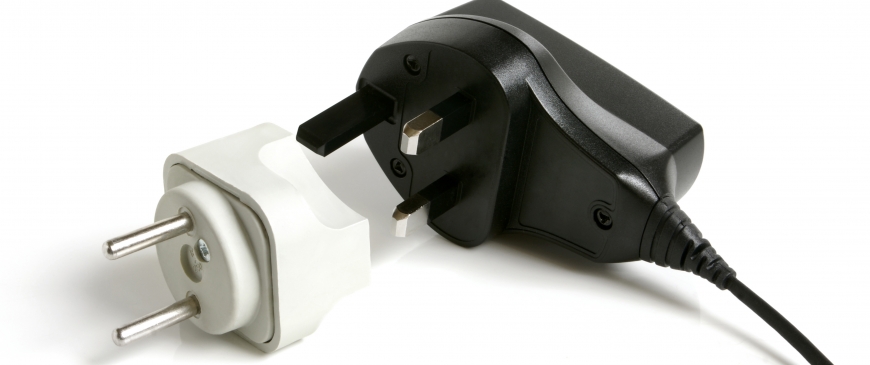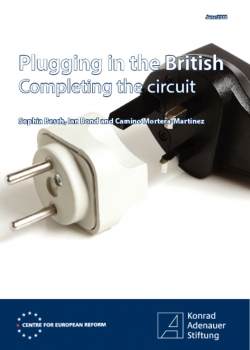
Plugging in the British: Completing the circuit
Post-Brexit internal and external security co-operation arrangements seem as hard for the EU and UK to agree on as trade. Other third countries’ relationships with the EU provide models.
The main focus of debate on the UK’s withdrawal from the EU has so far been on trade. But foreign and defence policy and law enforcement co-operation are also becoming important areas of disagreement. Plugging the UK into EU co-operation in these areas will not be straightforward.
Foreign policy
The EU has close relations with like-minded countries that offer various models for the UK/EU relationship. There is no single recipe for co-ordinating policy. Norway has almost no formal structures for foreign policy co-operation, while Canada has a legally binding treaty and the US a politically binding declaration. All formal structures are backed up by extensive informal contacts with the EU and the member-states. The EU wants to use these existing arrangements as templates; the UK argues that it should have a special status, with more influence in EU decision-making. The EU’s Common Foreign and Security Policy (CFSP) is largely inter-governmental. That creates more flexibility to accommodate non-member states – but there will still be limits to the privileges the UK can expect. The UK will not get a veto in EU discussions of foreign policy. But it should seek a treaty, like Canada’s, to ensure that its voice is always heard; and it should maintain formal and informal channels of communication to the EU institutions and the member-states. The British government has judged that EU development spending matches UK priorities and is well-managed, so it should look for ways to contribute to EU-run aid programmes.
If UK & #EU foreign policies diverge after #Brexit, both will find they have less influence over events. Can they find arrangements to avoid that? #PlugginginBritain
In the transition period, the EU has said that the UK might have special arrangements for consultation on CFSP on a case by case basis. The UK wants a guarantee of consultation before the EU takes foreign policy decisions, including on sanctions. The UK will need to decide whether to seek maximum autonomy from the EU or maximum infl uence on it; it cannot have both.
Defence
Both the EU and the UK have an interest in agreeing a post-Brexit defence relationship as soon as possible, to prevent Britain falling out of European defence co-operation at a crucial time, when the Union is developing new defence initiatives and has yet to determine the conditions for third party involvement. It will not be easy to find a compromise. The EU is keen to protect its decision-making autonomy on defence operations and missions. And defence industrial co-operation post-Brexit will depend in part on the broader trade and economic relationship between Britain and the EU.
Britain and the EU will have to negotiate an agreement to specify how the UK can participate in EU military operations after Brexit. Britain could commit to supplying a substantial number of troops or other military assets and continuing to pay into the EU’s common financing scheme for operations, subject to close UK involvement in information sharing, force generation and planning.
In UK-EU #defence #Brexit negotiations, both sides are posturing in ways that will harm their interests. #PlugginginBritain
With the European Defence Agency (EDA), the UK should seek an administrative agreement – which details the conditions under which a third country can participate in EDA joint capability projects – similar to Norway’s. And it should agree arrangements with the EU to allow UK organisations to tender for EU-funded defence projects. On space security, the EU and the UK both have an interest in finding an agreement on satellite navigation co-operation and on access to Galileo’s Public Regulated Service. But both sides are posturing in ways that will harm their interests, and risk poisoning the atmosphere for wider defence co-operation.
In the medium term, it is likely that Brexit will encourage the EU to rethink its relations with third states: first, to ensure that the UK continues to play a full part in EU missions and operations; and second, because the discussion with Britain will reveal shortcomings in existing agreements.
While negotiations continue, Britain should signal its goodwill. While the UK is still a member-state, it is technically free to veto EU defence initiatives, but it should refrain from doing so. Within NATO, Britain should make it a priority to champion a close partnership between the alliance and the EU.
If the EU excluded the UK from the Union’s defence infrastructure, it would not only lose British expertise and assets, but also potentially undermine the EU’s own efforts. The EU should not base its off er of a future defence relationship on Britain’s history of obstructing EU defence initiatives. Theresa May and her government have repeatedly stated their commitment to European security. The EU should take them at their word.
Justice and home affairs
Police and judicial co-operation in criminal matters is one of the issues yet to be agreed in the draft withdrawal agreement between the UK and the EU. The UK government wants a bespoke treaty with the EU, going beyond any existing deals the bloc has with third countries. But the EU’s guiding principle for negotiations with the UK is ‘no better out than in’. Both are opening positions in the negotiations and are likely to evolve over time. But time is a luxury neither the EU nor the UK has. Britain’s continued inability to come up with precise ideas does not help its cause.
The EU distinguishes between partnerships with non-EU Schengen members, like Norway and Switzerland; and arrangements with non-Schengen countries like the US and Canada. Schengen members have better access to EU police and judicial co-operation than countries outside Schengen, but they also have more obligations.
On extradition, the UK is unlikely to retain the European Arrest Warrant (EAW), which is open only to EU countries. After Brexit, Britain will have three options: first, it could seek bilateral agreements with the EU-27. But a system of 27 bilateral treaties would be harder to negotiate and less efficient than a pan-European extradition treaty. Second, it could fall back on the 1957 Council of Europe convention on extradition. But extradition under the convention takes almost 20 times longer than it does with the EAW. Finally, Britain could try to negotiate a surrender agreement like the one Norway and Iceland have with the EU. This agreement took 13 years to negotiate, is still not in force and will allow countries to refuse to extradite their own nationals.
Legal and political obstacles will not simply disappear just because both parties realise the importance of a close #security relationship after #Brexit. #PlugginginBritain
Britain is unlikely to retain direct access to Schengen’s main law enforcement database, the Schengen Information System (which contains a wide range of data, from outstanding extradition requests and suspected crimes to details of stolen or lost passports). After Brexit, the UK could ask Europol or a friendly EU or Schengen country to run searches on its behalf. It will be easier for the UK to stay plugged into non-Schengen databases containing fingerprints or air passenger data insofar as Britain complies with EU privacy rules, as the British government has said it will.
Britain should be able to post liaison officers to Europol, but like Denmark it would not to have direct access to Europol’s databases. The major obstacle to an agreement is that Britain’s negotiating red lines – no European Court of Justice (ECJ) jurisdiction, and no acceptance of the EU Charter of Fundamental Rights – are incompatible with its stated ambitions for the future security relationship. A future security treaty should include a dispute resolution mechanism which could be a totally new court, an arbitration mechanism or the ECJ. The more EU jurisdiction the UK accepts, the easier (and faster) it will be for Britain to get a good deal on law enforcement co-operation, as Brussels would have a way to monitor compliance and to ensure that Britain’s laws and practices were in line with EU requirements.
The treaty should be part of the wider Brexit deal, to minimise the risk of it being rejected by the European Parliament, which has voted down standalone EU-US agreements on data-sharing. This would also allow Britain and the EU to include a chapter on data protection that could apply both to trade and law enforcement. If Britain and the EU fail to reach a deal on security, the only winners will be criminals.
To support their future relationship, the UK and the EU should arrange personnel exchanges, so that EU diplomats, development, security and military offi cials spend time in UK ministries and vice versa. And the UK will need an agreement on information sharing – vital across all aspects of external and internal security and defence industrial co-operation.
Whatever arrangements the UK ultimately chooses for its internal and external security relationships with the EU, it will need to resource them properly, in Brussels and other EU capitals. British Ministers will need to devote more time to relations with the rest of Europe.
View press release

